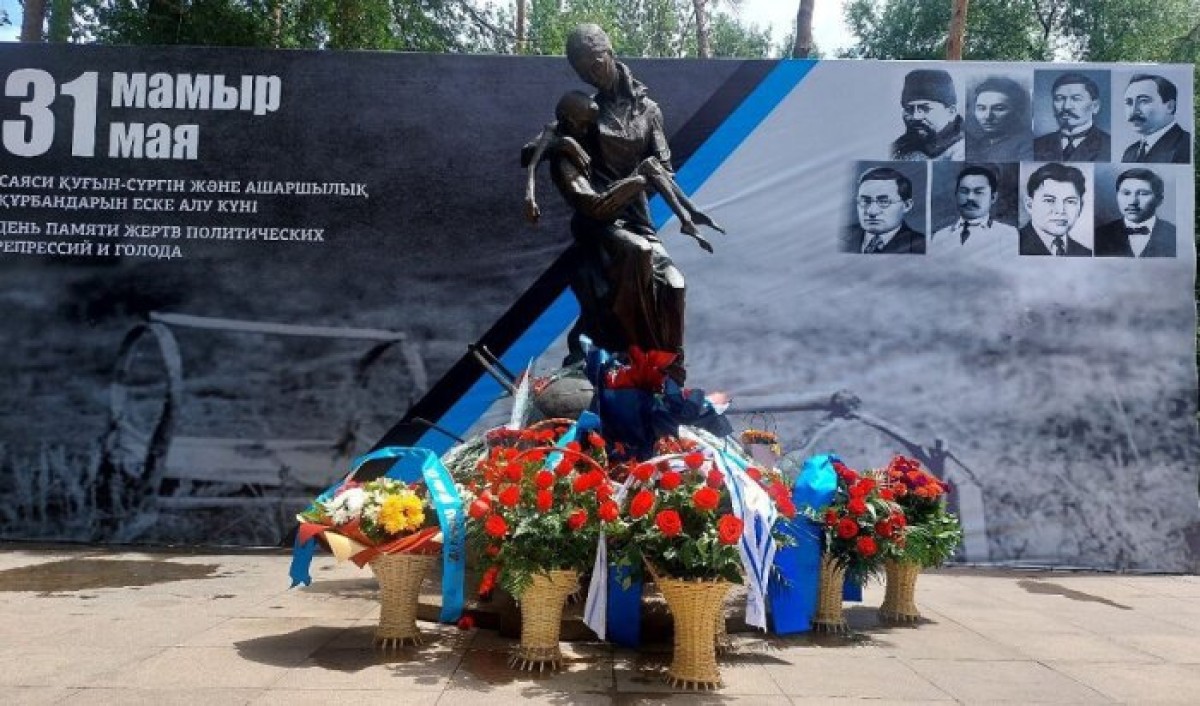ASTANA – On May 31, Kazakhstan is remembering the victims of political repressions and famine during the Soviet period in 1920s-1950s. The crimes of totalitarianism have left deep marks on the self-consciousness of the Kazakh people, President Kassym-Jomart Tokayev wrote on his Twitter account on the day which is commemorated in the nation as the Day of Remembrance of Victims of Political Repression.

Monument to the victims of 1931-1933 famine in Almaty. Photo credit: newtimes.kz
Tokayev noted the importance of continuing to study those dark pages of history, and restore justice to all the innocent victims. “It is the duty of each of us to learn the terrible lessons of the past and do everything possible to ensure this will never happen again,” the President wrote.
Tokayev added people should live up to the hopes of their ancestors, who withstood the most difficult trials, preserving the nation’s unity and faith in humanistic ideals.
In his interview with Kazinform, Nurbolat Abuov, director of the branch of the Shokan Ualikhanov Institute of History and Ethnology in Petropavlovsk, said a repressive policy during the totalitarian regime left a huge number of people unjustly arrested, executed, or exiled.
It led to the establishment of the GULAG forced labor camp system and many camps across Kazakhstan, while the countryside became a place to settle citizens of deported nations.
Abuov recalled that Kazakh people experienced forced resettling, famine, fleeing and migration during the years of repressions. The tragedy that occurred in Kazakhstan during the period of collectivization, a policy pursued in 1929 to 1933 to transform traditional agriculture in the Soviet Union, as well as the famine in Ukraine, the North Caucasus, the Volga Region and other regions of the former USSR, remained the greatest secret of the Communist Party and the Soviet totalitarian state for many years, he said.
An academic conference convened for the first time by academician Manash Kozybayev in November 1988 addressed the causes of death of the Kazakh population on a mass scale during the period of collectivization. This was the beginning of significant work to restore the history of the 1920s-1930s in Kazakhstan.
In the early 1990s, Kazakh historians worked to rehabilitate and restore the historical memory of representatives of the Kazakh intelligentsia and political figures.
One of the first steps in the formation of a common historical memory of the Kazakh people at the dawn of the country’s independence was the legislation on the rehabilitation of victims of mass political repressions adopted on April 14, 1993.
The law states that rehabilitation means the recognition of a person as a victim of political repression, the restoration of his/her violated rights, and compensation for moral or material damage caused.
On Nov. 24, 2020, President Tokayev issued a decree on the State Commission for the Full Rehabilitation of Victims of Political Repressions.
“The President instructed to resume work on restoring historical justice in relation to the victims of political repressions of the 1920s-1950s,” said Abuov.
Collecting the memories of the repressed and their descendants, the members of the regional commission became convinced almost every family witnessed episodes that somehow correlated with the repressive policy.
The Soviet state for many years drove the whole society into a tough ideological grip, not allowing to debunk the crimes of the totalitarian regime, not allowing to assess the scale of the tragedy, noted Abuov.
“Today, people in Kazakhstan have the opportunity to correlate their families’ tragedy with the tragedy of the whole nation, to feel like a part of the history of a large country that had found itself under the pressure of a tough ideology,” said the historian.
